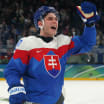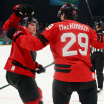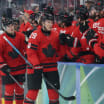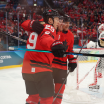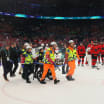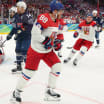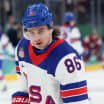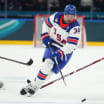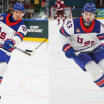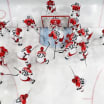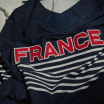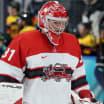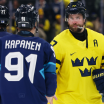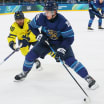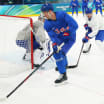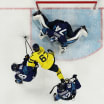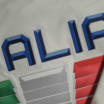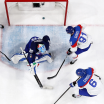Legendary hockey reporter Stan Fischler writes a weekly scrapbook for NHL.com. Fischler, known as "The Hockey Maven," shares his humor and insight with readers every Wednesday.
This week Fischler features his popular monthly segment, "Voices From the Past." Fischler's subject is a former forward nicknamed "The Eel" because Camille Henry was one of the skinniest, creative forwards in NHL history. He rarely surpassed 135 pounds, playing in the NHL from 1953-70, when he scored 528 points (279 goals, 249 assists) in 727 games with the New York Rangers, Chicago Black Hawks and St. Louis Blues.
Fischler interviewed Henry many times, beginning when Fischler worked in the Rangers publicity department in 1954-55. He also has a Camille Henry chapter in his book, "Where Have They Gone Hockey Stars?"
Henry had NHL success despite small physical stature
Forward played 14 seasons, won Calder, Lady Byng Trophies
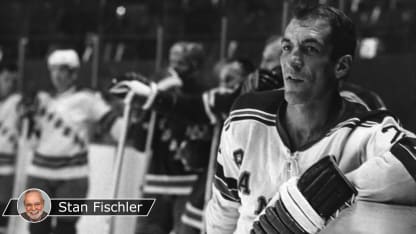
Did you ever think you'd make it to the NHL?
"Not at the beginning. When I started getting serious about hockey as a kid growing up in Quebec City all I heard was either that I was too small or too skinny. Or both. I have to admit that I wasn't very big, compared to other kids who were playing, and I didn't weigh all that much. But I loved hockey and played as much as I could and hoped for the best."
What was it like, growing up in Quebec City?
"My dream was the same as all the other French-speaking kids, to play for the Montreal Canadiens. I wanted to be just like my hero, [Maurice] 'Rocket' Richard. But as I started to play on the Bantam level, I kept hearing the talk about me being 'Too small' even though I led my team in scoring. It was the same thing in Midget when I was 14 years old, I hardly made the team, yet I wound up leading that league in scoring two years straight. And when I was 16, playing Juvenile, I led the league that year too. Still, they said, 'You're too skinny to ever reach the pros.'"
How did you surmount those obstacles?
"I still was good enough at scoring goals to play right up at the Junior level, That's where I finally found a coach who believed I had a future with the pros. He was a former Rangers star from their 1940 [Stanley] Cup team -- Phil Watson. He was coaching the Quebec Citadelles and liked what he saw in me despite my size and weight. It also helped that Phil was a French-Canadian like me and I could communicate with him. He really put me on the right road to pro."
What was Watson like as a coach?
"At that time, Phil was great; maybe the best I ever had in my whole career. But he didn't know how to talk to players. He didn't know how to treat them like men. He had a complex about not speaking the English language perfectly. Meanwhile I learned English because my roommate in Quebec, Aggie Kukulowicz, helped me. He would speak French to me and I had to answer him in English. By the end of my second year with the Citadelles I was well on my way to learning English and also at the top of the scoring lists."
How did you get to the NHL?
"Watson was connected to the Rangers at the time, and he told the (New York) manager, Frank Boucher, about me and I got invited to New York's training camp in the fall of 1953. On the afternoon of the Rangers first preseason game, Boucher told me that I was going to play. I did well and by the time training camp was over I had more points than any other center on the team. At the end of camp Boucher said I could make the team but he wasn't going to dress me right away."
When did you break into the lineup?
"The Rangers opened '53-'54 in Detroit and during the game our left wing Dean Prentice dislocated his shoulder. Boucher told me to dress for the next game in Chicago, which I did. We won 5-2 and I wound up getting a goal and an assist. I got some good help from that point on, especially from our Max Bentley who had won three Stanley Cups when he was with Toronto [Maple Leafs]. Maxie was our quarterback on the power play and the biggest help I ever had in hockey."
How did he help?
"He talked hockey with me non-stop. He explained how to play certain guys and what to do in certain types of situations. When we went on road trips -- those long train rides -- he used to have to kick me out of his room at five in the morning. That's all we would do is talk hockey. We could stay up all night just figuring different things about the game."
What was it like on ice with Max?
"He was very exciting. One night in Detroit he told me he was going to score against the Red Wings. This was against their greatest team with Gordie Howe, Ted Lindsay, Alex Delvecchio up front and the great Terry Sawchuk in goal. So, I told Max, 'You score one and I'll score one.' Next thing I know, he skated through the whole darn team and then put a move on Sawchuk and scored. Then, he skated over to our bench and I said, 'What about me?' And he said, 'Don't worry; you'll score!'"
Was he right about that?
"A minute later, Max got the puck and did almost the same thing; skated through the entire Detroit team and got right in front of Sawchuk. He pulled Terry out and had him cold turkey. But instead of shooting he passed the puck over to where I had come down the left side. There was no way in the world that I could have missed, so I put the puck in the net. It was that easy. Shows you what kind of guy Max was."
You did a lot of damage to Detroit as a rookie, didn't you?
"I'll never forget it. We were near the end of the season (March 13, 1954) and in Detroit. At the time, Terry Sawchuk looked like he was a cinch to win the Vezina Trophy (voted as the top goalie in the NHL). He was ahead of Toronto's Harry Lumley for that prize as well as leading in voting for the First All-Star Team. Meanwhile, I was in the running for the Calder Trophy (voted) as top rookie along with Jean Beliveau of the Canadiens. The amazing thing was that I had a four-goal game that night, all on the power play. Bentley assisted on three of them and that knocked Sawchuk out of the Vezina and First All-Star Team. I don't think Terry ever forgave me for that. And I'm sure that night was what enabled me to beat out Beliveau for the Calder."
What was it like playing in New York?
"I loved all 11 years of it and the first few seasons were especially good. When Phil Watson took over as coach in 1955, we started to develop a fine team. Young guys like Andy Bathgate, Harry Howell, Dean Prentice and Lou Fontinato began to mature as big leaguers. Me, too. We made the playoffs in '56, '57, and '58. Those were the same years when the Canadiens were winning five straight Cups. ('56, '57, '58, '59, '60) so even though we were good, Montreal always was better."
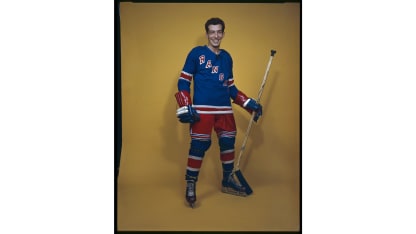
What went wrong?
"Watson. He thought there was a clique of players on the Rangers who were against him. He thought (defenseman) Bill Gadsby was the leader. Phil accused 'Gads' of leading a rebellion against him. Watson thought I also was in the clique along with Andy Hebenton, Gump Worsley and Andy Bathgate. According to Phil, there were six of us but he thought the whole world was against him. And when we blew our lead over Toronto and missed the playoffs on the last day of the (1958-59) season things got even worse. But Phil survived into the next fall. We started the new schedule poorly and wound up in Montreal about the time Phil got fired."
How did it happen?
"He ordered a light skate and I was the first one on the ice. Right off the bat Phil started yelling at me. He said the only reason I was in the NHL was because of him. That I was no damn good, too small, and I couldn't play defense. When he was finished yelling at just about everybody, Phil asked Eddie Shack if his lecture had done any good. Eddie pointed at his left ear and said, 'In one ear and out the other.' It wasn't long after that when our manager, Muzz Patrick, fired Watson."
How did you make out after Watson had left?
"I did fine. In fact, I had my best year in '62-'63 with 37 goals and 23 assists. But I was getting banged around a lot and it started to really affect my game. Two years later they called me in and said I was traded to Chicago [Black Hawks]. The deal was made because my back was sore. I eventually had an operation on it and when the big expansion came in 1967, I wound up with the [St. Louis] Blues. I felt good, we made the playoffs and I enjoyed hockey again. But the next year they asked me to be player-coach of their minor league team in Kansas City."
How did it go?
"We were playing Oklahoma City when a young defenseman caught me with a clean check and I had to be carried to the bench. I could feel the knee swelling up and I knew then and there that I'd never play hockey again. I still wanted to play, but I knew that I couldn't."
What was your fondest memory as a player?
"Beating out Jean Beliveau for the Calder and later winning the Lady Byng Trophy (in 1957-58, for sportsmanship, gentlemanly play and high standard of playing ability). Also, very special was the night I scored those four goals against Detroit, all on the power play. Believe it or not, Sawchuk never forgave me. A year later I ran into him and Terry said, 'You little squirt. I keep you in business. If it wasn't for me, you wouldn't be in the League!' Well, that was one time Terry was wrong because I had more than 10 NHL years after that!"
Photos courtesy of the New York Rangers
